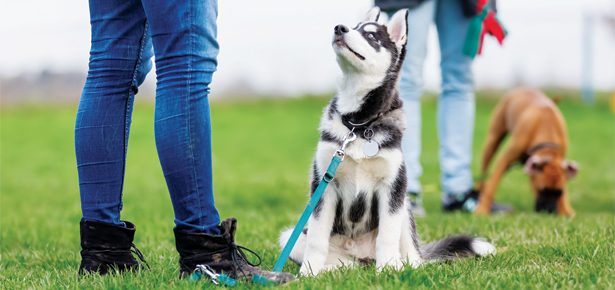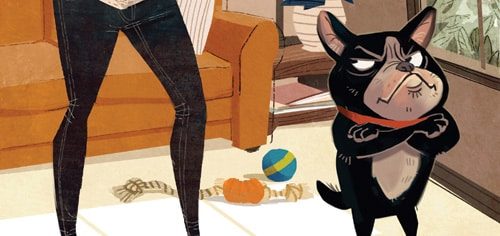

Boarding School for Dogs
Should you send your dog away for training? A behaviourist explains what to look for—and who this works for.
“My dog had extra training with the breeder,” my new client explained, her voice thick with frustration. “We let them keep her longer—and paid them extra—so she would be housetrained and learn her commands. But she doesn’t know anything!”
“That sounds disappointing,” I said. “Did they teach you how to work with her?”
“They sent us this video,” she said, pulling it up on her phone. The video showed the puppy performing behaviours, but it wasn’t that impressive. When the trainer asked the puppy to sit five times in a row before the puppy sat, I cut it short.
“Other than the video, what lessons did you have?” I asked my client.
“We didn’t have any lessons,” she replied.
“That’s the problem,” I explained. “Board and train programs don’t work unless YOU get trained along with your dog.”
My client sighed. “I wish I’d known that several thousand dollars ago.”
FANTASY VS. REALITY
If your car is making an alarming noise, you can take it to a mechanic. They’ll fix the car, hand you the key, and you can drive it away. Problem solved! Dogs are not cars. You can’t take your dog to a trainer for repair, then simply take the leash and go back home. Board and train programs sound ideal. Someone else does all the work and you get a fully trained dog. If that’s what someone tries to sell you, however, be sure to ask if a bridge comes along with the deal.
There ARE quality board and train programs available. It’s up to you to do your research and find a professional program that can deliver results. Also understand that without your participation, no program will be successful.
WHY USE A BOARD AND TRAIN PROGRAM?
There are some great reasons you may want or need help training your dog. One major reason is that training dogs is not your specialty. You may not be very good at it, and that’s ok. (You’re great at lots of other things!) Professional, high-quality trainers study ethology, biology, behavioural psychology, and more to be able to do what they do well. They have years of experience and education in the field. Training dogs is actually a lot of work, and specialized work at that. Having a professional work with your dog directly can jump start training quickly and efficiently. You’ll need to maintain those behaviours, but you won’t need to teach them from scratch.
Another reason some pet parents choose board and train programs is due to their age. Just because we get older doesn’t mean we dog lovers give up having dogs. Running around after an exuberant puppy is a lot easier in your 30s than in your 60s. Choosing a board and train program to get a puppy off to a trained start can be a practical solution.
WHO THEY WORK FOR… AND WHO THEY DON’T
Board and train programs can work for puppies and dogs that need basic obedience and manners training. They are also great for specialized training, such as for service dogs. They are not recommended for fear and aggression cases. If you have a dog that growls, snaps, or bites people, sending them away to “camp” will not help you learn how to manage your dog in your home environment. Depending on the program, it could make your dog much worse. For example, most aggression is based in fear. If the trainer uses punishment (choke, prong, or shock collars) to punish a dog for being afraid, this just makes fear worse. The symptoms of fear—growling, snapping, lunging—may subside temporarily, but the root of the problem is still there. There is no magic camp to fix aggressive dogs. If you have an aggressive dog, your best bet for help is with in-home lessons from a professional trainer. For severe cases, you may need the assistance of a veterinary behaviourist. You will work together with them to help your dog.

Illustration by GoodStudio/Bigstock.com
HOW TO CHOOSE A QUALITY PROGRAM
Board and train programs generally are more expensive than private lessons. You’ll find programs from trainers, breeders, doggie day cares, and even groomers. You should understand that the dog training industry is not regulated. There is no one “certification” to become a dog trainer. Anyone can call themselves a trainer. This means it’s up to the pet parent to weed out the qualified from the quacks.
HERE ARE SOME THINGS TO LOOK OUT FOR
- That a qualified trainer will be doing the training. Just because a breeder creates beautiful puppies doesn’t mean he or she has a background in the behavioural psychology of dogs or canine learning. Yes, there are breeder-trainers, but check to make sure.
- Trainer credentials. Is the trainer certified? If yes, by what organization? To date, there is only one independent certification for dog trainers in the United States, and that’s the Certification Council of Professional Dog Trainers (CCPDT). If the trainer is certified, did they get their certification by completing one course? For example, a trainer who completes a six-week program is not going to have the education of someone who completes a six-month course. If the trainer doesn’t have a certification, what education and experience does he or she have? Does the trainer attend continuing education every year to remain up to date in the industry? If you’re going to be paying thousands of dollars to train a dog, make sure the person doing the training is worth the expense.
- Program methodology. Too many people sign up for a board and train program without asking what tools will be used on their dogs. They’re then devastated when they learn their dog has been shocked for weeks. What specific tools does the program use? If the methodology does not follow positive, modern, science-based,
humane methods, steer clear. - What are the living conditions? A house? A kennel? How much time outside of the crate or kennel will your dog have each day? How many other dogs are there?
- For puppies, what socialization will be done? The critical socialization period for puppies ends at 12 weeks. Immediate family members or staff is not enough. Puppies need to safely explore the world off property and be introduced to a variety of people and other dogs.
- What training will you get? Videos and handouts are probably not enough. A quick summary upon pickup of your dog is not enough. You need lessons to transfer behaviours to you. It won’t do you any good if your dog only listens to the trainer. Remember, the best trainers can teach your dog, but you ultimately live with your canine family member. You will need to maintain their training, or they will lose it. A quality board and train program will also spend time training you.
Board and train programs aren’t for everyone. It can be challenging finding a good one. Taking time to research can save you a lot of money and frustration. If you’re going to choose a boarding school, choose wisely!
This article originally appeared in the award-winning Modern Dog magazine. Subscribe today!
Join the newsletter and never miss out on dog content again!
"*" indicates required fields
By clicking the arrow, you agree to our web Terms of Use and Privacy & Cookie Policy. Easy unsubscribe links are provided in every email.





